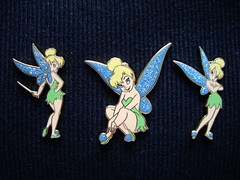Peter Pan
Tinker Bell
Wendy Darling
From Wendy to Tink: Part 3
Sunday, June 14, 2009
 Image by isazappy via Flickr
Image by isazappy via Flickr
Throughout the story of Peter Pan, Wendy tries to live up to the image of the perfect wife and mother. She's really just replicating her own family life. (Ew. Have you done that?) In Neverland, she tells stories, darns socks, sweeps the floor, tells everyone where to sleep, and doles out medicine.
"She loved to give them medicine, and undoubtedly gave them too much. Of course it was only water, but it was out of a bottle, and she always shook the bottle and counted the drops, which gave it a certain medicinal quality."It's her determination to play mother that comes between her and Peter. Peter doesn't mind if she mothers the Lost Boys. In fact, that's part of the reason he was convinced she'd be useful to him in Neverland. But when Wendy tries to mother Peter, and insists that Peter must change his ways, he rebels, and Wendy and the Lost Boys end up in the clutches of the vile Captain Hook.
Is Wendy's effort to change Peter, to make him grow up, the root of the problem? No. Although any woman who's ever been in a relationship with any member of the opposite sex--from boyfriend, to husband, to son--knows that getting a man to change is the equivalent of beating your head against the walls of an elevator and hoping it will move to the right floor. The real problem lies in Wendy. Wendy isn't really living. She's playing a marvelous game of pretend, and the people around her fill the roles she's created in her mind. Wendy doesn't really love Peter. He merely fills a role in her little melodrama. When he refuses to cooperate, she's terribly disappointed.
In contrast, Tinker Bell is really living. She's not playing, not trying to live up to some ideal--human or fairy. Tinker Bell's sense of identity isn't dependent on Peter and the Lost Boys. She's a fairy/woman who knows what she wants and gets it.
"But there was one recess in the wall, no larger than a bird-cage, which was the private apartment of Tinker Bell. It could be shut off from the rest of the house by a tiny curtain, which Tink, who was most fastidious, always kept drawn when dressing or undressing. No woman, however large, could have had a more exquisite boudoir and bed-chamber combined. The couch, as she always called it, was a genuine Queen Mab, with club legs; and she varied the bedspreads according to what fruit-blossom was in season. Her mirror was a Puss-in-Boots, of which there are now only three, unchipped, known to fairy dealers; the washstand was Pie-crust and reversible, the chest of drawers an authentic Charming the Sixth, and the carpet and rugs the best (the early) period of Margery and Robin. There was a chandelier from Tiddlywinks for the look of the thing, but of course she lit the residence herself. Tink was very contemptuous of the rest of the house, as indeed was perhaps inevitable, and her chamber, though beautiful, looked rather conceited, having the appearance of a nose permanently turned up."Peter's foolish actions often aggravate Tinker Bell. Throughout the story, her most frequent statement to Peter is, "You silly ass." No wonder she never speaks in the Disney version! Peter's attention to Wendy annoys Tink, but you get the impression she knows his fascination with Wendy will soon fade, for the "great, ugly Wendy-bird" is merely another of his distractions. Tink is fully aware of Peter's faults, but she does nothing to fix him. Why? Because she loves him. Really loves him. Unconditionally.
I know. That rankles. The notion that we should love the defective people in our lives without trying to fix them is contrary to some basic sense of feminine law. But it's that dogged determination to rearrange the people around us that triggers our self-defeating Wendy behavior and leaves us exhausted, bitter, and resentful.
Wendy takes care of everyone else.
Tinker Bell takes care of herself first.
Does this mean that you need to become a selfish, conceited, child-neglecting wife and mother? Not at all. But it does mean you'll stop putting yourself last, because you are a daughter of the most high God. It means you'll stop thinking about what HE or THEY (spouse, kids, neighbors, parents, coworkers) want without even considering what YOU would like.
It means you'll go buy some new underwear for yourself before you're down to raggedy elastic and you won't feel guilty about it. How many women feel guilty for taking a nap? Have you EVER met a man who felt guilty for taking a nap? It means that when you catch yourself feeling resentful about things like housework, running errands, or having sex, you'll stop and check your motives. Are you doing those things to satisfy your identity crisis? To try and gain someone's approval? What about the things you secretly wish you could do but haven't tried? What's stopping you?
What would Tinkerbell do? I challenge you to ask yourself that question in those situations where Wendy behavior has crept in and either left you disappointed, resentful, or trapped in some twisted game of pretend. Take off the Wendy nightie and put on your Tinkerbell outfit, and start living!

![Reblog this post [with Zemanta]](http://img.zemanta.com/reblog_e.png?x-id=30f260cd-435e-479f-b80e-8d0d52f1ff89)











0 Comments